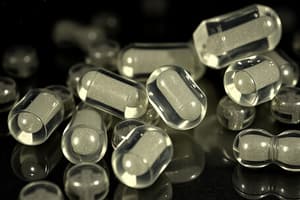Podcast
Questions and Answers
What is the primary reason for adding procaine to benzylpenicillin?
What is the primary reason for adding procaine to benzylpenicillin?
- To enhance the absorption of benzylpenicillin
- To increase the antimicrobial spectrum of benzylpenicillin
- To reduce the pain and discomfort associated with intramuscular injection of penicillin (correct)
- To prolong the duration of action of benzylpenicillin
What is the duration of action of benzathine penicillin?
What is the duration of action of benzathine penicillin?
- 14 days or longer (correct)
- 28 days or longer
- 21 days or longer
- 7-10 days
Which of the following penicillins is effective against Gram-negative bacteria?
Which of the following penicillins is effective against Gram-negative bacteria?
- Phenoxymethylpenicillin
- Penicillin G
- Oxacillin
- Ampicillin (correct)
What is the indication for using Penicillin G?
What is the indication for using Penicillin G?
Which generation of cephalosporins is active against most gram-positive cocci with minimal coverage against gram-negative bacteria?
Which generation of cephalosporins is active against most gram-positive cocci with minimal coverage against gram-negative bacteria?
What is the use of cefazolin in surgical prophylaxis?
What is the use of cefazolin in surgical prophylaxis?
Which of the following is a contraindication for using benzylpenicillin?
Which of the following is a contraindication for using benzylpenicillin?
What is the mechanism of action of β-lactam antibiotics?
What is the mechanism of action of β-lactam antibiotics?
Which of the following is a characteristic of benzathine penicillin?
Which of the following is a characteristic of benzathine penicillin?
What is the adverse effect of intramuscular injection of penicillin?
What is the adverse effect of intramuscular injection of penicillin?
Flashcards are hidden until you start studying
Study Notes
Inhibitors of Cell Wall Biosynthesis: β-Lactam Antibiotics
- β-lactam antibiotics include penicillins, cephalosporins, carbapenems, and monobactams.
Cephalosporins
- Cephalosporins are contraindicated in patients with allergies to them or those who have had an anaphylactic reaction to penicillin or other beta-lactams.
- Ceftriaxone is contraindicated in hyperbilirubinemic neonates and infants less than 28 days old who are expected to receive calcium-containing products.
- Side effects of cephalosporins include pseudomembranous colitis, hypersensitivity reactions, and cross-reactivity with penicillin.
- Cephalosporins have low toxicity and are generally safe.
- Administration of cephalosporins: oral or parenteral for 1st, 2nd, and 3rd generations; parenteral for 5th generation; cefazolin and ceftriaxone have longer half-lives.
Generations of Cephalosporins
- 1st generation: e.g. cefazolin, cephapirin, cephradine; active against gram-positive cocci with minimal coverage against gram-negative bacteria.
- 2nd generation: e.g. cefuroxime; broader coverage against gram-negative bacteria.
- 3rd generation: e.g. ceftriaxone, ceftazidime; extended coverage against gram-negative bacteria, including Pseudomonas aeruginosa.
- 4th generation: e.g. cefepime; extended coverage against gram-negative bacteria, including Pseudomonas aeruginosa.
- 5th generation: e.g. ceftaroline; broad-spectrum antimicrobial covering susceptible gram-positive and gram-negative organisms, including MRSA, but not Pseudomonas aeruginosa.
Penicillins
- Penicillins are active against gram-positive bacteria, with some members also effective against gram-negative bacteria.
- Examples of orally effective penicillins: phenoxymethylpenicillin (penicillin V), oxacillin, cloxacillin, flucloxacillin, ampicillin, and amoxicillin.
- Penicillin G is used to treat syphilis, skin infections, meningitis, and rheumatic fever.
- Procaine benzylpenicillin is administered by deep intramuscular injection and is aimed at reducing pain and discomfort.
- Benzathine penicillin is a long-acting penicillin injection that can remain in the blood for a detectable level for 14 days or longer.
Studying That Suits You
Use AI to generate personalized quizzes and flashcards to suit your learning preferences.




